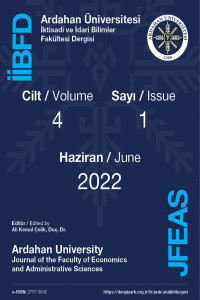Muhasebe bilgi kalitesinin sermaye piysasalarına etkisi: BIST-50 üzerine bir uygulama
Muhasebe Bilgi Kalitesi, Düzeltilmiş Jones Modeli, BIST-50, Sermaye Piyasaları, Bağımsız Denetçi Görüşü
The effect of accounting information quality on capital market: an application on BIST-50
Accounting Information Quality, Adjusted Jones Model, BIST-50, Capital Markets, Independent Auditor,
___
- Ball, R., & Brown, P. (1968). An empirical evaluation of accounting income numbers. Journal of Accounting Research, 6(2), 159-178.
- Bulut Deniz, M. (2018). Muhasebe Bilgi Sistemi Bağlamında Çevre Muhasebesinin Türkiye Muhasebe Standartları (TMS) / Türkiye Finansal Raporlama Standartları (TFRS) Açısından Değerlendirilmesi ve Malatya Organize Sanayi Bölgesi’nde Bir Araştırma. Doktora Tezi, İnönü Üniversitesi Sosyal Bilimler Enstitüsü, Malatya.
- Dechow PM, Sloan RG, Sweeney, AP (1995). Detecting Earnings Management. The Accounting Review,70(2), 193-225.
- Dechow, P.M. (1994). Accounting Earnings and Cash Flows as Measures of Firm Performance: The Role of Accounting Accruals. Journal of Accounting and Economics, 18, 3-42.
- Demirel Arıcı, N. ve Karğın, M., (2017). Muhasebe bilgilerinin kalitesini etkileyen faktörler üzerine bir literatür incelemesi. Yönetim ve Ekonomi Dergisi, 24, 216-233.
- Demirel, Arıcı N. (2014). Sermaye piyasalarında muhasebe bilgilerinin kalitesi: Borsa İstanbul üzerine bir uygulama. Doktora Tezi, Celal Bayar Üniversitesi, Sosyal Bilimler Enstitüsü, Manisa.
- Dichev, I.D., Graham,J.R., Harvey,C. R. & Rajgopal,S. (2013). Earnings Quality: Evidence from the Field. Journal of Accounting and Economics, 56, 1-33.
- Easton, P.D. & Harris, T.S. (1991). Earnings as an Explanatory Variable for Returns. Journal of Accounting Research, 29(1), 19-36.
- Ebaid, İ.E. (2013). Corporate governance and investors' perceptions of earnings quality: egyptian perspective. Corporate Governance, 13(3), 261-273.
- Ercan, C., İşseveroğlu, G. (2016). Olumlu denetçi görüşünün hisse senedi fiyatlarına etkisi: Borsa İstanbul örneği. Akademik Bakış Dergisi, 55, 630-639.
- Erdem, B. (2020). Bağımsız denetim muafiyet eşiklerinin yolsuzluk endeksi üzerindeki etkisi: Avrupa birliği ülkelerinde bir analiz. Mali Çözüm Dergisi, 1(160), 143-162
- FASB (1978). Objectives of Financial Reporting by Business Enterprises, Concepts Statement No. 1. http://www.fasb.org/pdf/con1.pdf (28.07.2020)
- FASB (2010). Conceptual Framework for Financial Reporting—Chapter 1, The Objective of General Purpose Financial Reporting, and Chapter 3, Qualitative Characteristics of Useful Financial Information (a replacement of FASB Concepts Statements No. 1 and No.2), ConceptsStatementNo.8. http://www.fasb.org/jsp/FASB/Page/PreCodSectionPage&cid=1176156317989 (28.07.2020).
- Francis, J. and K. Schipper (1999). Have Financial Statements Lost Their Relevance? Journal of Accounting Research, 37(2), 319-352.
- IASB (2010). Conceptual Framework for Financial Reporting 2010.
- https://www.ifrs.org/issued-standards/list-of-standards (28.07.2020)
- İsmail, W.A.W., K.A. Kamarudin, T.V. Zijl and K. Dunstan (2013). Earnings Quality and the Adoption of IFRS-based Accounting Standards: Evidence from an Emerging Market. Asian Review of Accounting, 21(1), 53-73.
- Karğın, M. Demirel Arıcı, N. (2015). Muhasebe bilgilerinin kalitesini ölçmeye yönelik bir çalışma: Borsa İstanbul örneği. Muhasebe ve Finansman Dergisi, 1(67), 1-22.
- Kayalıdere, K. (2013). Hisse senedi piyasasında muhasebe bilgilerinin rolü: İMKB mali sektör üzerine bir uygulama. İşletme Araştırmaları Dergisi, 5(1),130-151.
- Ohlson, J. A. (1991). The theory of value and earnings, and an introduction to the Ball‐Brown analysis. Contemporary Accounting Research, 8(1), 1-19.
- Ohlson, J.A. (1995). Earnings, book values, and dividends in equity valuation.Contemporary Accounting Research, 11(2), 661-687.
- Örten, R., Kaval, H. & Karapınar, A. (2008). Türkiye Muhasebe-Finansal Raporlama Standartları, Uygulama ve Yorumları. Ankara: Gazi Kitabevi.
- Özkalkan, K. (2019). Yolsuzluğun önlenmesinde denetimin rolü ve etkinliğinin artırılması. İstanbul Sosyal Bilimler Dergisi, 1-22
- Özkan, S., & Kaytmaz Balsari, C. (2010). Impact of financial crises on the value relevance of earnings and book value: 1994 and 2001 crises in Turkey. Iktisat Isletme ve Finans, 25(288), 81-95.
- Özkan, S., Durukan, M.B. & Dalkılıç, F. (2005). Approaches to Measuring Quality of Earnings and Discussion of the Applicability of these Approaches to IstanbulStock Exchange (ISE) Companies. I. Uluslararası Muhasebe Denetimi Sempozyumu ve VII. Türkiye Muhasebe Denetimi Sempozyumu, 20-24 Nisan, Antalya.
- Sloan, R.G. (1996). Do stock prices fully reflect information in accruals and cash flows about future earnings? The Accounting Review, 71(3), 289-315
- Vaziri, A., & Azadi, K. (2017). The impact of audit reports on financial information content.International Journal of Economics and Financial Issues, 7(3), 304-308.
- Wickramasingha, S.R.M.&Nanayakkara, K.G.M. (2015). The external auditor’s opinions and the stakeholders’ purposes: An empirical analysis in sri lanka.Kelaniya Journal of Management, 4(1), 31-49.
- ISSN: 2148-7154
- Yayın Aralığı: Yılda 2 Sayı
- Başlangıç: 2015
- Yayıncı: Ardahan Üniversitesi
Pazarlamada blokzinciri teknolojisinin kullanımı: avantajlar ve engeller
Bihter BİÇER OYMAK, İpek KAZANÇOĞLU
AHP ile çok kriterli ABC stok sınıflandırma üzerine bir uygulama
Marmara Bölgesi’ndeki konteyner limanlarının etkinlik ölçümü ve potansiyel iyileştirme önerileri
Şehirleşme-sosyoekonomik gelişme ilişkisinin etki-tepki fonksiyonları ile analizi: Türkiye örneği
İlknur Yeşim DİNÇEL, Gizem DİNÇEL
Muhasebe dersi alan öğrencilerin etik algısı: Kafkas ve Iğdır Üniversitesi örneği
Seyhan ÖZTÜRK, Osman Nuri AKARSU
Pazarlamanın varoluşsal krizi ve geleceği
